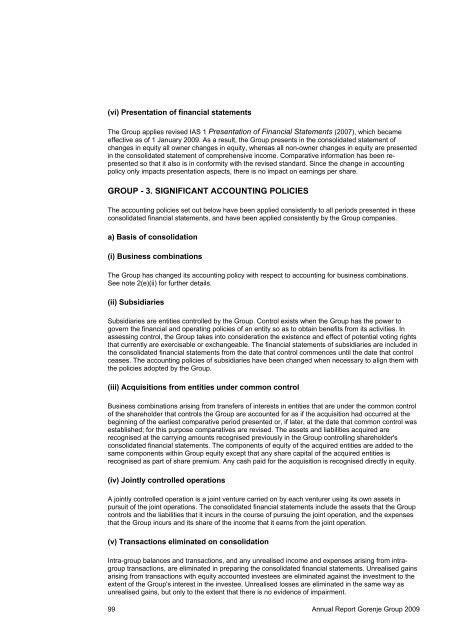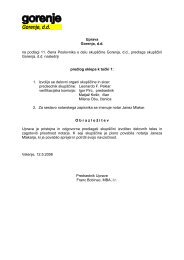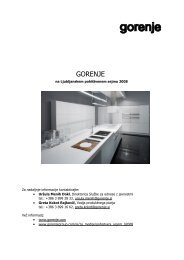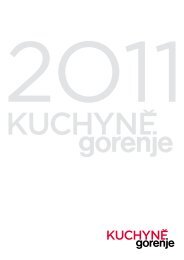Annual Report Gorenje Group 2009
Annual Report Gorenje Group 2009
Annual Report Gorenje Group 2009
Create successful ePaper yourself
Turn your PDF publications into a flip-book with our unique Google optimized e-Paper software.
(vi) Presentation of financial statements<br />
The <strong>Group</strong> applies revised IAS 1 Presentation of Financial Statements (2007), which became<br />
effective as of 1 January <strong>2009</strong>. As a result, the <strong>Group</strong> presents in the consolidated statement of<br />
changes in equity all owner changes in equity, whereas all non-owner changes in equity are presented<br />
in the consolidated statement of comprehensive income. Comparative information has been represented<br />
so that it also is in conformity with the revised standard. Since the change in accounting<br />
policy only impacts presentation aspects, there is no impact on earnings per share.<br />
GROUP - 3. SIGNIFICANT ACCOUNTING POLICIES<br />
The accounting policies set out below have been applied consistently to all periods presented in these<br />
consolidated financial statements, and have been applied consistently by the <strong>Group</strong> companies.<br />
a) Basis of consolidation<br />
(i) Business combinations<br />
The <strong>Group</strong> has changed its accounting policy with respect to accounting for business combinations.<br />
See note 2(e)(ii) for further details.<br />
(ii) Subsidiaries<br />
Subsidiaries are entities controlled by the <strong>Group</strong>. Control exists when the <strong>Group</strong> has the power to<br />
govern the financial and operating policies of an entity so as to obtain benefits from its activities. In<br />
assessing control, the <strong>Group</strong> takes into consideration the existence and effect of potential voting rights<br />
that currently are exercisable or exchangeable. The financial statements of subsidiaries are included in<br />
the consolidated financial statements from the date that control commences until the date that control<br />
ceases. The accounting policies of subsidiaries have been changed when necessary to align them with<br />
the policies adopted by the <strong>Group</strong>.<br />
(iii) Acquisitions from entities under common control<br />
Business combinations arising from transfers of interests in entities that are under the common control<br />
of the shareholder that controls the <strong>Group</strong> are accounted for as if the acquisition had occurred at the<br />
beginning of the earliest comparative period presented or, if later, at the date that common control was<br />
established; for this purpose comparatives are revised. The assets and liabilities acquired are<br />
recognised at the carrying amounts recognised previously in the <strong>Group</strong> controlling shareholder's<br />
consolidated financial statements. The components of equity of the acquired entities are added to the<br />
same components within <strong>Group</strong> equity except that any share capital of the acquired entities is<br />
recognised as part of share premium. Any cash paid for the acquisition is recognised directly in equity.<br />
(iv) Jointly controlled operations<br />
A jointly controlled operation is a joint venture carried on by each venturer using its own assets in<br />
pursuit of the joint operations. The consolidated financial statements include the assets that the <strong>Group</strong><br />
controls and the liabilities that it incurs in the course of pursuing the joint operation, and the expenses<br />
that the <strong>Group</strong> incurs and its share of the income that it earns from the joint operation.<br />
(v) Transactions eliminated on consolidation<br />
Intra-group balances and transactions, and any unrealised income and expenses arising from intragroup<br />
transactions, are eliminated in preparing the consolidated financial statements. Unrealised gains<br />
arising from transactions with equity accounted investees are eliminated against the investment to the<br />
extent of the <strong>Group</strong>'s interest in the investee. Unrealised losses are eliminated in the same way as<br />
unrealised gains, but only to the extent that there is no evidence of impairment.<br />
99<br />
<strong>Annual</strong> <strong>Report</strong> <strong>Gorenje</strong> <strong>Group</strong> <strong>2009</strong>

















